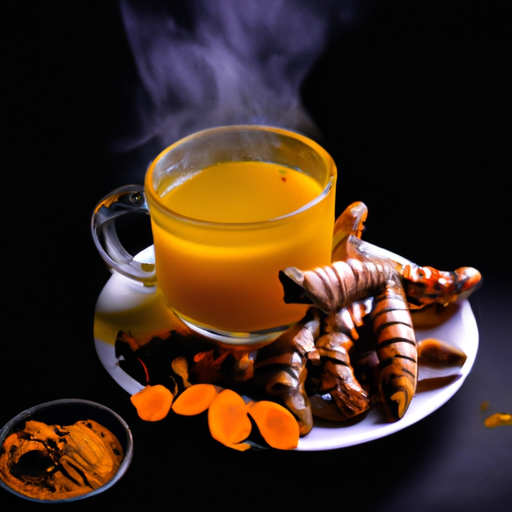I am always mindful of my daily calorie consumption, and I frequently ponder the calorie content of various foods. Lately, turmeric has piqued my curiosity.
Turmeric is a commonly used spice in Indian and Middle Eastern cuisine and has been touted for its numerous health benefits. But, does turmeric have calories?
In this article, we will explore the nutritional value of turmeric, including its calorie content. We will also delve into the science behind the health benefits of this spice, its potential side effects, and how you can incorporate it into your diet.
Whether you are a health enthusiast or simply curious about the nutritional content of your food, this article will provide you with evidence-based information about turmeric.
Key Takeaways
- Turmeric contains only 9 calories per teaspoon, making it a low-calorie seasoning option.
- Turmeric has numerous health benefits due to its compound curcumin, which has anti-inflammatory and antioxidant properties.
- Dishes that use turmeric as a spice may contain higher amounts of calories due to added fats and other ingredients.
- Incorporating turmeric into your daily diet has a negligible impact on your daily caloric intake and can have positive impacts on weight loss and skin health.
What is Turmeric?
Turmeric is a must-have spice in any kitchen, adding a burst of flavor and color to your dishes. It is a plant that belongs to the ginger family and is mostly cultivated in Southeast Asia and India. The roots of the turmeric plant are harvested and processed into a yellow-orange powder, which is commonly used for its medicinal properties and as a cooking ingredient.
Turmeric has been used for thousands of years in traditional medicine and Ayurvedic practices. It contains a compound called curcumin, which has anti-inflammatory and antioxidant properties. In addition to its use in cooking and medicine, turmeric has also been used as a dye for fabrics and paper.
With its rich history and diverse uses, turmeric is a fascinating spice that continues to captivate people around the world. And now, let’s dive into the topic of turmeric and calories.
Turmeric and Calories
When it comes to understanding the caloric content of turmeric, one teaspoon of turmeric powder contains only 9 calories.
This means that incorporating turmeric into your daily diet has a negligible impact on your daily caloric intake.
As someone who’s health-conscious, this makes turmeric an excellent addition to my meals. It not only adds flavor but also provides numerous health benefits without adding unnecessary calories.
Understanding Caloric Content
To fully grasp the impact of a food on our body, it’s important to comprehend its caloric content, as the old saying goes: ‘You are what you eat.’
When it comes to understanding serving sizes and nutritional value of turmeric, there are a few key points to keep in mind. Firstly, one teaspoon of turmeric powder contains only 9 calories, making it an incredibly low-calorie food. Secondly, turmeric is a great source of antioxidants and has anti-inflammatory properties, making it a valuable addition to any diet.
It’s important to note that while turmeric itself is low in calories, the same cannot be said for dishes that incorporate it. Curries and other dishes that use turmeric as a spice may contain higher amounts of calories due to added fats and other ingredients. With this in mind, it’s important to consider the overall nutritional value of a dish when incorporating turmeric into your meals.
One Teaspoon of Turmeric Powder
Understanding the impact of a small amount of turmeric powder can enhance the nutritional value and health benefits of your meals. Using turmeric for seasoning is a simple and effective way to add flavor and color to your dishes.
One teaspoon of turmeric powder contains only about 9 calories, making it a low-calorie seasoning option. However, turmeric is not just a flavorful addition to your meals; it also has numerous health benefits.
One of the health benefits of turmeric is its potential for improving skin health. Turmeric contains curcumin, which has anti-inflammatory and antioxidant properties. These properties may help to reduce inflammation and oxidative damage in the skin, which can lead to a range of skin conditions. Incorporating turmeric into your diet can provide a natural way to support healthy skin.
Despite these benefits, turmeric has a negligible impact on daily caloric intake, making it a great seasoning option for those looking to watch their calorie intake.
Negligible Impact on Daily Caloric Intake
It’s almost unbelievable that such a flavorful and beneficial seasoning like turmeric has such a negligible impact on daily calorie intake. One teaspoon of turmeric powder contains only 9 calories, making it a great addition to any weight loss diet. Compared to other spices like cinnamon or cumin, which contain around 19 and 22 calories per teaspoon respectively, turmeric is a low-calorie option that won’t sabotage your efforts to shed those extra pounds.
But turmeric’s impact on weight loss goes beyond its low calorie count. This spice has been shown to have anti-inflammatory properties that may help reduce inflammation in the body, which is linked to obesity and weight gain. Plus, turmeric has been found to increase metabolism, which can further aid in weight loss efforts. So, not only is turmeric a delicious and low-calorie addition to your meals, but it may also have a positive impact on your weight loss journey.
When it comes to Indian and Middle Eastern cuisine, turmeric plays a key role in many traditional dishes.
The Role of Turmeric in Indian and Middle Eastern Cuisine
I’m excited to discuss the role of turmeric in Indian and Middle Eastern cuisine.
Turmeric is a staple spice in these regions and is used in a variety of popular dishes such as curry, dahl, and biryani.
Its traditional uses include adding flavor and color to dishes, as well as its medicinal properties.
Its culinary significance cannot be overstated, as it has been used for centuries and continues to be an important ingredient in modern cuisine.
Popular Dishes
Turmeric doesn’t add any extra calories to popular dishes like curry or rice, but it does add a distinctive flavor and bright yellow color. In fact, turmeric is commonly used in Indian and Middle Eastern cuisine for its flavor and health benefits.
However, turmeric is not just limited to savory dishes. It can also be used in desserts like turmeric-infused ice cream or turmeric-spiced cake. Additionally, turmeric can be found in popular drinks like golden milk or turmeric tea.
While turmeric is commonly used in modern cuisine, it has a long history of traditional uses in Ayurvedic and Chinese medicine. Turmeric has been used as a natural anti-inflammatory and pain reliever for centuries. It has also been used to treat digestive issues, skin conditions, and even depression.
Understanding the traditional uses of turmeric can help us appreciate its culinary and medicinal value.
Traditional Uses
Folklore and ancient medical practices attest to the medicinal properties of turmeric, which has been used for centuries to cure various ailments. This golden spice is a staple ingredient in traditional Ayurvedic medicine and is believed to have anti-inflammatory, antioxidant, and antimicrobial effects. It is also used to treat digestive issues, skin problems, and respiratory infections.
In addition to its therapeutic benefits, turmeric holds cultural significance in many countries, including India, where it is used in religious ceremonies and as a symbol of purity and prosperity. Turmeric’s culinary significance is just as important as its medicinal and cultural significance. The spice is commonly used in Indian, Middle Eastern, and Southeast Asian cuisine, where it adds a warm, earthy flavor and vibrant color to dishes such as curries, soups, and rice dishes.
Its popularity has also spread to Western cuisine, where it is used in everything from smoothies to baked goods. Despite its widespread use in cooking, turmeric is not a significant source of calories, making it a healthy and flavorful addition to any diet.
Culinary Significance
You’ll be delighted to know that turmeric’s warm, earthy flavor and vibrant color make it a popular ingredient in Indian, Middle Eastern, and Southeast Asian cuisine, as well as in Western cuisine, adding a healthy and flavorful twist to your favorite dishes.
Here are some culinary techniques that highlight turmeric’s unique taste and health benefits:
-
Spice up your curries: Turmeric is a key ingredient in curry powder and can be used to add depth and complexity to any curry dish. Its warm, slightly bitter flavor pairs well with other spices like cumin, coriander, and ginger.
-
Boost your morning smoothie: Add a pinch of turmeric to your morning smoothie for a healthy kick. Not only does it add color and flavor, but turmeric has also been shown to have anti-inflammatory and antioxidant properties.
-
Experiment with turmeric-infused oils and butters: Infusing oils and butters with turmeric can add a subtle flavor and color to dishes like roasted vegetables or grilled meats. It’s also a great way to incorporate turmeric’s medicinal properties into your cooking.
Turmeric’s versatility in the kitchen makes it a great addition to any cook’s pantry.
In the next section, we’ll explore how turmeric can be used as a supplement for even more health benefits.
Turmeric as a Supplement
Adding turmeric to your supplement routine can have a significant impact on your overall health and well-being. Turmeric supplements contain high levels of curcumin, which is a powerful anti-inflammatory agent. Inflammation is the root cause of many chronic diseases such as heart disease, cancer, and Alzheimer’s, so reducing inflammation in your body can lead to significant health benefits.
When it comes to taking turmeric supplements, dosage recommendations vary depending on the individual and their health needs. It’s important to consult with a healthcare professional before adding any new supplement to your routine. Generally, a daily dose of 500-2000mg of curcumin is recommended for optimal health benefits.
The science behind turmeric’s health benefits is fascinating, and we’ll explore it in the subsequent section.
The Science Behind Turmeric’s Health Benefits
As I mentioned in the previous section, turmeric is often used as a supplement due to its potential health benefits. But what exactly are those benefits and how does turmeric work in the body? Let’s dive into the science behind turmeric’s health benefits.
- Turmeric and inflammation: One of the most well-known benefits of turmeric is its ability to reduce inflammation in the body. This is due to the active ingredient, curcumin, which has been shown to inhibit certain inflammatory pathways.
Inflammation is a natural response by the immune system to injury or infection, but chronic inflammation can lead to a variety of health conditions such as arthritis, heart disease, and even cancer.
-
Turmeric and cancer prevention: Speaking of cancer, there is also evidence to suggest that turmeric may have anti-cancer properties. Curcumin has been shown to inhibit the growth and spread of cancer cells in laboratory studies. While more research is needed to determine the full extent of turmeric’s anti-cancer effects, this is certainly an exciting area of research.
-
Turmeric and brain health: There is also some evidence to suggest that turmeric may have benefits for brain health. Curcumin has been shown to increase levels of a growth hormone called Brain-Derived Neurotrophic Factor (BDNF), which is important for the growth and survival of neurons. Low levels of BDNF have been linked to depression and Alzheimer’s disease.
-
Turmeric and gut health: Lastly, turmeric may also have benefits for digestive health. Curcumin has been shown to reduce symptoms of irritable bowel syndrome (IBS) and improve gut barrier function. This could have implications for a variety of digestive disorders.
Incorporating turmeric into your diet or taking it as a supplement may offer a variety of health benefits, from reducing inflammation to potentially preventing cancer. In the next section, we’ll explore the ways in which turmeric can aid in digestion.
Turmeric and Digestion
I’m excited to delve into the topic of how turmeric impacts digestion.
Turmeric is known for its anti-inflammatory effects on the digestive system, which can help alleviate symptoms of digestive issues.
There is potential for turmeric to be used as a natural remedy for digestive ailments, as it has been traditionally used for this purpose.
Anti-inflammatory Effects on Digestive System
You can reap the benefits of turmeric’s anti-inflammatory effects on your digestive system without worrying about any extra calories. Turmeric has been shown to have a positive impact on gut microbiome, which is the collection of microorganisms in your digestive tract. A healthy gut microbiome is essential in maintaining a healthy digestive system and can even aid in weight loss.
Studies have shown that curcumin, the active compound in turmeric, can improve gut health by increasing the production of beneficial bacteria and reducing inflammation in the gut. In addition to its impact on gut microbiome, turmeric has been found to have anti-inflammatory effects on the digestive system. This can help alleviate symptoms of digestive issues such as bloating, gas, and indigestion.
Furthermore, turmeric has been shown to be effective in treating inflammatory bowel disease (IBD) by reducing inflammation in the gut. With its numerous benefits for digestive health, turmeric is a natural and effective way to promote a healthy digestive system.
Potential Benefits for Digestive Issues
One potential benefit of turmeric for digestive issues is its ability to alleviate symptoms such as bloating and indigestion. This was shown in a clinical trial where participants experienced a significant reduction in these symptoms after taking a turmeric supplement. The active ingredient in turmeric, curcumin, has anti-inflammatory properties that can reduce inflammation in the digestive tract. This leads to improved digestive function and less discomfort.
Many people turn to herbal remedies and alternative treatments for digestive issues, and turmeric is one of the most popular options. While more research is needed to fully understand the effectiveness of turmeric for digestive health, the results of existing studies are promising.
In the next section, we will explore the traditional uses of turmeric for digestive health.
Traditional Uses for Digestive Health
As I mentioned earlier, turmeric has the potential to alleviate various digestive issues. But did you know that it’s been used for centuries in herbal remedies for digestive health?
In Ayurvedic medicine, turmeric is believed to stimulate the production of digestive enzymes and bile, which can aid in the breakdown of food and absorption of nutrients. It’s also thought to reduce inflammation in the gut, which can alleviate symptoms of irritable bowel syndrome and other inflammatory bowel diseases.
In addition to its traditional uses for digestive health, turmeric has been used in Ayurvedic medicine to treat a variety of ailments, including skin conditions, respiratory infections, and even depression. The ancient Indian system of medicine recognizes the interconnectedness of the mind, body, and spirit, and turmeric is believed to promote balance and harmony in all three areas.
This holistic approach to health is gaining popularity in the Western world, as more people seek natural remedies for their ailments. As we move into the next section about turmeric and mental health, it’s important to remember the interconnectedness of the body and mind.
Turmeric’s potential benefits for digestive health may seem unrelated to mental health, but the two are actually closely linked. Inflammation in the gut can lead to inflammation in the brain, which can contribute to depression and other mental health disorders. By reducing inflammation in the gut, turmeric may also have a positive impact on mental health.
Turmeric and Mental Health
I’m excited to dive into the topic of turmeric and mental health.
There is promising research on the potential benefits of turmeric for depression and anxiety.
Additionally, turmeric has been used traditionally for mental health purposes in various cultures.
I’m interested in exploring the current research on turmeric and its effects on mental health.
Potential Benefits for Depression and Anxiety
You can add a sprinkle of turmeric to your morning oatmeal and feel a sense of calm throughout the day, as studies suggest it may have potential benefits for depression and anxiety. Turmeric has been found to contain curcumin, a compound that has anti-inflammatory and antioxidant properties. These properties have been shown to potentially alleviate symptoms of depression and anxiety by reducing inflammation and oxidative stress in the brain.
Some potential benefits of turmeric for depression and anxiety include:
- Reducing symptoms of depression and anxiety
- Improving brain function
- Boosting mood and well-being
- Supporting the body’s natural stress response
While more research is needed to fully understand the effects of turmeric on mental health, incorporating it into your diet may be a simple and natural way to support your overall well-being. In the next section, we’ll explore traditional uses for mental health that have been used for centuries.
Traditional Uses for Mental Health
Exploring traditional uses for mental health can provide insight into ancient practices that have been effective in promoting well-being for centuries. One fascinating example is the use of natural remedies such as herbs and acupuncture.
In China, acupuncture has been used for treating depression and anxiety, and studies have found it to be effective in over 70% of patients. This traditional practice involves the insertion of thin needles into specific points on the body to stimulate the body’s natural healing processes and balance energy flow.
In addition to acupuncture, natural herbs have also been used for their mental health benefits throughout history. For example, turmeric has been used in Ayurvedic medicine for centuries to treat a variety of ailments, including depression and anxiety. Its active ingredient, curcumin, has been found to have anti-inflammatory and antioxidant properties, which may contribute to its mental health benefits.
In the next section, we’ll explore current research on turmeric and mental health to better understand the potential benefits of this ancient herb.
Current Research on Turmeric and Mental Health
Get ready to discover the exciting research that shows how turmeric can be a helpful tool in improving your mental health.
Turmeric supplements have been found to have potential antidepressant effects in clinical trials. In a randomized, double-blind, placebo-controlled trial, participants with major depressive disorder were given either a turmeric supplement or placebo for eight weeks. The group taking the turmeric supplement showed significant improvement in symptoms compared to the placebo group.
Another clinical trial found that a combination of turmeric and saffron supplements was effective in reducing symptoms of mild to moderate depression.
In addition to its potential antidepressant effects, turmeric has also been studied for its potential benefits in improving cognitive function and reducing anxiety. However, more research is needed to fully understand the extent of its effects on mental health.
As we move forward in exploring the potential benefits of turmeric, it’s important to also consider the possible side effects of turmeric, which we’ll discuss in the next section.
Possible Side Effects of Turmeric
I want to talk about the possible side effects of turmeric. As with any supplement or medication, there are potential risks and drawbacks to using turmeric.
Specifically, I want to discuss three key points: the interactions with medications, potential allergic reactions, and the dangers of taking high doses.
It’s important to be aware of these risks before incorporating turmeric into your diet or health routine.
Interactions with Medications
Turmeric can interact with certain medications, so it’s important to consult with a healthcare provider before adding it to your diet. Here are some possible risks associated with the use of turmeric in combination with certain medications:
-
Blood thinners: Turmeric may increase the risk of bleeding when taken with anticoagulant or antiplatelet drugs, such as warfarin, aspirin, or clopidogrel.
-
Diabetes medications: Turmeric may lower blood sugar levels and could interact with diabetes medications, causing hypoglycemia (low blood sugar).
-
Stomach acid reducers: Turmeric may increase the production of stomach acid and interfere with the action of acid-reducing drugs, such as omeprazole or ranitidine.
-
Iron supplements: Turmeric may decrease the absorption of iron from supplements or foods, which could lead to iron deficiency anemia.
It’s important to be aware of these potential interactions and to talk to your healthcare provider before using turmeric as a supplement or spice. Moving on to the next topic, potential allergic reactions to turmeric should also be considered.
Potential Allergic Reactions
It’s important to consider potential allergic reactions when incorporating turmeric into your diet. Although turmeric is generally considered safe for consumption, some people may experience allergic reactions to the spice.
Symptoms of an allergic reaction to turmeric may include hives, itching, swelling, and difficulty breathing. In severe cases, anaphylaxis may occur, which can be life-threatening.
If you suspect that you are allergic to turmeric or experience any of the aforementioned symptoms, it is important to seek medical treatment immediately. Treatment may involve the use of antihistamines or epinephrine, depending on the severity of the reaction.
To prevent allergic reactions, it is recommended that individuals begin incorporating small doses of turmeric into their diets and gradually increase the dosage over time. Additionally, individuals should consult with their healthcare provider before adding turmeric to their diets to ensure that it is safe for them to do so.
It’s important to be aware of potential allergic reactions when incorporating turmeric into your diet, but it’s also important to be aware of the dangers of high doses.
Dangers of High Doses
You might be surprised to learn that consuming too much turmeric can actually be harmful to your health. While turmeric is generally safe to consume in moderate amounts, excessive intake can lead to toxicity.
Here are some signs of toxicity to watch out for and tips on managing your turmeric intake:
- Gastrointestinal issues such as nausea, diarrhea, and stomach pain.
- Skin irritation or rashes.
- Increased risk of bleeding, especially if you’re taking blood thinners.
To avoid these risks, it’s important to consume turmeric in moderation. The recommended daily intake is up to 1.5 teaspoons of turmeric powder. If you’re taking turmeric supplements, it’s important to follow the dosage instructions on the label. Always consult with a healthcare professional before taking any new supplements or making significant changes to your diet.
Incorporating turmeric into your diet can be a great way to add flavor and potential health benefits to your meals. In the next section, we’ll explore some simple ways to incorporate turmeric into your daily routine.
Incorporating Turmeric into Your Diet
If you want to add a little spice and flavor to your meals, try sprinkling some turmeric on your dishes. Not only will it add a unique taste, but it also has numerous health benefits.
Turmeric has anti-inflammatory properties, which can help reduce inflammation in the body and potentially lower the risk of chronic diseases such as heart disease and cancer.
Incorporating turmeric into your diet is easy and delicious. There are many turmeric recipes available online, from turmeric-laced rice dishes to golden milk lattes. You can also add turmeric to soups, stews, and even smoothies.
So next time you’re cooking a meal, don’t forget to add a little turmeric to spice things up and boost your health at the same time!
Frequently Asked Questions
Does turmeric have any effect on skin health?
I used to struggle with acne, but after discovering the power of turmeric for acne, my skin has never looked better. Incorporating a turmeric face mask into my routine has reduced inflammation and improved my complexion.
Can turmeric be used as a natural remedy for joint pain?
Yes, turmeric can be a natural alternative for joint pain relief. Studies suggest that its active ingredient, curcumin, has anti-inflammatory properties. Turmeric supplements can also be effective, but consult a doctor first.
Is it safe to consume turmeric during pregnancy?
Coincidentally, I was just wondering about the pregnancy safety of consuming turmeric. While turmeric is generally safe in moderate amounts, it’s best to consult with a healthcare provider before adding it to your diet during pregnancy.
Does turmeric have any impact on blood sugar levels?
I’ve researched the impact of turmeric on blood sugar management and found promising benefits. Studies suggest that turmeric can help regulate blood sugar levels by improving insulin sensitivity and reducing inflammation.
How long does it take for turmeric to start showing health benefits?
Based on research, it can take anywhere from 4-8 weeks of consistent turmeric consumption to see health benefits. Recommended daily dosage is 500-2000mg. Caloric content is minimal and not a concern.
Conclusion
Overall, turmeric is a versatile spice that can be used in a variety of ways. Whether you’re adding it to your meals for flavor or taking it as a supplement for its health benefits, turmeric is a great addition to any diet. And the best part? It has virtually no calories!
So, you can enjoy all the benefits of turmeric without worrying about it affecting your daily calorie intake. But before you start incorporating turmeric into your diet, it’s important to do your research and consult with a healthcare professional.
While turmeric is generally safe, it can interact with certain medications and may not be suitable for everyone. So, ask yourself: how can I safely and effectively incorporate turmeric into my lifestyle? With the right knowledge and guidance, you can reap the many benefits of this amazing spice.










